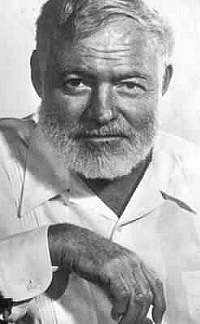 Ernest Hemingway is generally acknowledged as the true father of the tough crime writers of the twenties and thirties, their stylistic and philosophical headmaster. Hemingway did more than any other single writer to legitimize the colloquial mode in American prose; he perfected a clean, idiomatic style. He and the hacks cranking out a penny a word for the flourishing pulp jungle had much in common: a concern for the true sounds and rhythms of American speech and a posture of American toughness and durability. But while Hemingway's influence was pervasive, he was never considered merely hard-bioled.
Ernest Hemingway is generally acknowledged as the true father of the tough crime writers of the twenties and thirties, their stylistic and philosophical headmaster. Hemingway did more than any other single writer to legitimize the colloquial mode in American prose; he perfected a clean, idiomatic style. He and the hacks cranking out a penny a word for the flourishing pulp jungle had much in common: a concern for the true sounds and rhythms of American speech and a posture of American toughness and durability. But while Hemingway's influence was pervasive, he was never considered merely hard-bioled.
The typical Hemingway hero held on to his stance of self-reliant masculinity in a way that paralleled the hard-boiled stars--the Sam Spades and Philip Marlowes--of the Black Mask brigade. Hemingway's men keep a tight rein on their emotions, guardedly resisting feelings, their fiercely willed stoicism a shield against chaos. The struggle for control and the denial of feelings are reflected in Hemingway's spare, taut, compulsively worked-over language, where everything is concrete and immediate, where descriptions (whether of climate or landscape or food or people) are confined to a tight neutral tone, like a journalist reporting the externals of a scene as they seemed to him to be at the time.
Chaste and withheld, with a simplicity arrived at through rigorous self-discipline, the Hemingway style quickly became the dominant mode of American realism. Yet beneath the compact tough-guy stance is a creeping sense of hysteria, an ongoing hint that the hard-boiled pose can crack at any moment. It is in exactly this tension between surface and subtext, between the seeming poise of the characters and the language and the underlying unrest, that Hemingway transcends the Black Mask school. For the most part, the image that the hard-boiled heroes present to the world is accurate, whereas Hemingway's stoics--the wounded Jake Barnes, in The Sun Also Rises, or Frederick Henry, fleeing from war in A Farewell to Arms--often construct a facade which is almost the opposite of what they really are "deep down." The split in Hemingway's characters between their public and private selves is often decisive, while in much crime writing the characters have no private selves at all.
Hemingway honed the hard-boiled style, but only one of his novels (To Have and Have Not) and only a few of his short stories ("The Killers" pre-eminently) qualify as specifically hard-boiled. Harry Morgan, the hero of To Have and Have Not, is a full-fledged tough guy who tries to make ends meet running a fishing boat from Havana harbor. Betrayed by a rich client, who steals off without paying the money he owes, Harry slips into criminal activity, illegally transporting a group of Chinese and Cuban revolutionaries. A determined man, capable of violence, he dislikes trafficking with criminals, but he compromises because he sees no other way to support himself. A heavy drinker who spends his time in bars, he is also a terrific lover.
Killed in a shootout aboard his boat, Harry Morgan, like the old fisherman in The Old Man and the Sea, makes a superhuman effort to survive against enormous odds. His defeat is rendered in heroic terms, as the action of a special man. Harry is a more exalted figure than the tight-lipped private eye, but the world he moves in, the challenges he faces, and the posture he assumes, are all much the same as those of the lesser Spades and Marlowes of the pulps and of noir.
--FOSTER HIRSCH, from Film Noir
The Dark Side of the Screen.